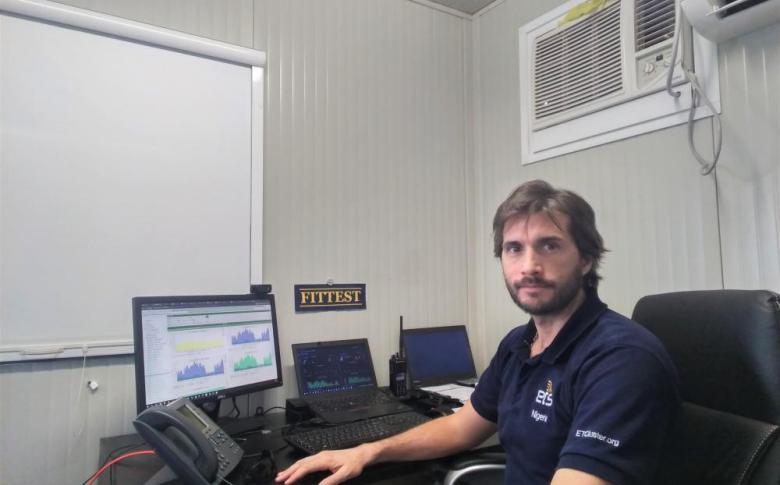WFP FITTEST responds to COVID-19: Luis in Nigeria

WFP's Fast IT and Telecommunications invention team - FITTEST - deploy all over the world to deliver life-saving communications services. The only member of the Emergency Telecommunications Sector (ETS) North-East Nigeria team remaining in the field during the height of the COVID-19 pandemic, FITTEST's Luis Portatadino opened up about life in lockdown and looking forward to being reunited with his family in this guest blog.
By Elizabeth Millership
“To be honest, I don’t need a lot of people — I can do this.”
Usually a quiet type, FITTEST’s Luis Portatadino is more than happy to chat after ten weeks sitting alone in the 20-by-10 foot prefab container that serves as his office.
“Here is the tour,” he chuckles, holding up the laptop to reveal a quiet room with two empty chairs and desks usually occupied by other members of the Emergency Telecommunications Sector (ETS) Nigeria team.
Luis is the last one standing in the ETS team of seven, who bring connectivity to thousands of humanitarians in North-East Nigeria. He has remained in the field in case of critical need.
The ETS team operate in Borno state, one of the three worst-affected areas since the beginning of the violent conflict in 2009 that has left seven million people in need of life-saving assistance.
Before the pandemic, the ETS office buzzed with the sounds of activity in the surrounding Red Roof compound, a hub which most humanitarians in North-East Nigeria call home. Now, the constant hum of the 24/7 power generator is the only noise to break the hush of Luis’s surroundings.
“We came to the ‘real’ lockdown very late, just recently — it lasted two weeks,” Luis explains. “Abuja, Lagos — the main cities have been locked down since March but here in Borno state, the cases have not been so many, and people need to work.”
Indeed, in Nigeria it is a balancing act between curbing the spread of the virus — there are over 9,000 confirmed cases — and stemming the growing desperation of vast numbers living hand to mouth. With over 80 per cent of workers employed in the informal sector, the livelihoods of many Nigerians depend on daily income for survival.
“Here in the compound, we have been isolating as best we can,” says Luis. “From my perspective though, isolation hasn’t affected me much — I didn’t go out much anyway, even before the virus,” he says. The options are limited — leaving Red Roof means visiting another nearby humanitarian compound and there is a strict 10pm curfew in place for security purposes.
Up to 100 humanitarians usually stay in the Red Roof hub which houses both offices and accommodation. Luis was part of the team, which, in 2017, transformed the hub from a series of tents to the sizable and fully connected base it is today.
Luis assures that he still sees other people from time to time during the day, although the rainy season is keeping him inside more and more.
“I’m not the kind of person who needs other people to be happy. And it’s enough that I can talk to my family for an hour every day on the phone,” he says. “The only problem I have — I don’t have a date for going back home and that bothers me…I wish I knew when this might end so I can be mentally prepared.”
Travel restrictions meant that he missed his eldest daughter’s eleventh birthday last month. “She’s so independent though — the apple doesn’t fall far from the tree, as they say,” Luis says with a smile.
He left his native Argentina many years ago, eager to see the world. In fact, it’s one of the reasons why he became a humanitarian: “The truth is, I like going to places where you cannot usually go. The experience — it’s something I need to remind myself of the world’s realities,” he says.
Luis’s job keeps him extraordinarily grounded.
Although the pandemic has significantly reduced the number of ETS missions, Luis considers this an opportunity: “I keep myself very busy — if there is something to fix, I fix it. I’m not someone who needs to be told what to do.”
And so, he is patiently waiting out the remainder of the pandemic, not knowing when it will be possible to travel the long distance from Borno state to his family in Spain. Until that time, the task of holding down the fort is in safe and steady hands.
Learn more about WFP FITTEST